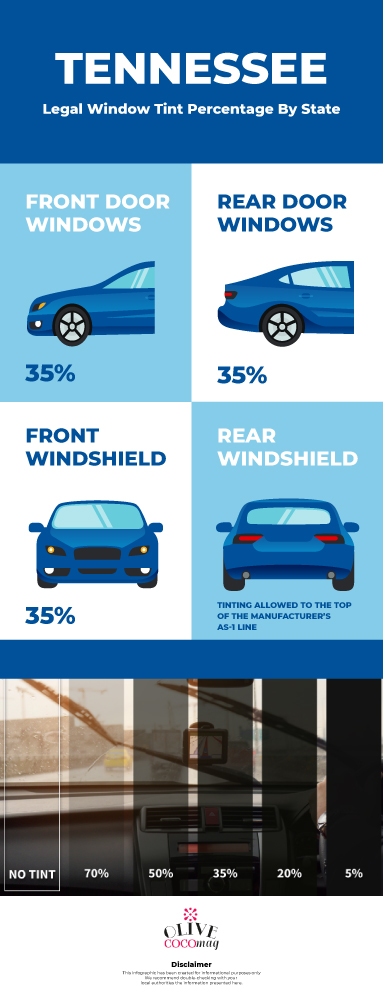The Tennessee window tint laws were enacted in the year 1990. This state was the 11th to enact these laws out of all the 50 states. There are many important rules and regulations that you need to consider related to vehicle window tinting in the state of Tennessee. If these laws are duly followed, there would be no accusations from legal authorities. Since these laws differ from other state laws, it is necessary to identify the conditions. This context consists of all the things you need to know about Tennessee window tint law.
The darkness factor is indicated as Visible Light Transmission percentage. This shows the amount of light that can pass through the window film. The following details include the legal amount allowed in Tennessee tint laws. Let’s move onto the details.

Table of Contents
Window Tint Darkness in Tennessee
Tint darkness for sedans, SUVs, and vans:
- Windshield: Must allow more than 70% of light in; any darkness on AS-1 line.
- Front Side windows: Must allow more than 35% of light in.
- Back Side windows: Must allow more than 35% of light in.
- Rear Window: Must allow more than 35% of light in.
To choose what shades you can have in your car in accordance with these percentages, look up the Window Tint Shades Chart.
Window Tint Reflection in Tennessee
Tint reflection for sedans, SUVs, and vans:
- Front Side windows: No mirrored or metallic appearance.
- Back Side windows: No mirrored or metallic appearance.
Other Tennessee Window Tint Rules and Regulations:
The following are some of the other concerns and important facts that mostly result infrequently asked questions related to Tennessee tint laws.
- Side Mirrors
The Tennessee window tint laws state that motor trucks should have at least one unobstructed mirror if it is loaded so that the driver can see the rear of the vehicle.
- Restricted Colors
There are no color restrictions according to the Tennessee window tint laws. All colors of window tints are allowed in this state.
- Certificates and Stickers
It is not required for film manufacturers to certify the film in order to sell it in Tennessee. However, a sticker is required to be placed between the film and the glass to identify legal tinting in Tennessee. This should be on the driver’s side window.
Identify the best type of tint that can suit your budget from Types of Car Window Tint and How Much to Tint Car Windows.
- Medical Exceptions
Tennessee window tint law allows medical exemptions for special tints. Any person, who has medical conditions where he would be adversely affected by ultraviolet radiation, can apply for a special medical exemption. A prescription from a licensed physician or a dermatologist stating the condition of that person is required. This shall be evaluated by the department’s medical review board after it is certified by the commissioner. The board will recommend the commissioner authorize the exemption and degree of tinting if the board sees that the exemption is warranted. Then, a certificate indicating the degree of exemption is supplied by the commissioner. The applicant needs to display this in his motor vehicle.
The medical conditions that are applicable for medical exemptions include sunlight allergy, photosensitivity, melanoma, and skin cancers. It is not mandatory to be the driver of the vehicle for this. Even if you are a frequent passenger with such medical conditions, you will be allowed to have an exception.
Learn about the effects of these UVA and UVB radiations from UV Blocking Tints and the benefit of IR blocking window tints in How Window Film Reduces Heat Inside the Car.
How Much is a Ticket for Window Tint in Tennessee?
In case of violating the car window tint law of Tennessee, there is a very high probability of getting pulled over. Depending on the case, the fine could range from $130 to $300. The tracing technology of legal tint is so advanced that the authorities have a small indicator that slides on the window tint and displays the VLT percentage on a digital screen.
If you are having trouble getting an appointment with your film installer, you can learn how to tint your own vehicle with DIY methods, from How to Tint Car Windows. We also bring you Tips on Window Tinting Aftercare.
If you are looking for a way to remove your old car window tint, refer to the article on How to Remove Window Tint.
Visit Window Tint Laws in the U.S. by State for details on legal limitations on vehicle window tinting in each state.
State of Tennessee Information
The state of Tennessee is located in the southeastern part of the United States. It has Kentucky and Virginia from the north and North Carolina in the east. Georgia, Alabama, and Mississippi are located to the south, while Arkansas and Missouri are situated to the west of Tennessee. The western border of the state is formed by the Mississippi River, and the Appalachian Mountains are in the eastern part of the state. Tennessee is the 36th state in terms of land extension and also the 17th most populous state. The capital is Nashville which is also the second-largest city in the state. The population is over 6.9 million. The total area is 42,143 square miles (109,247 square kilometers).
Keep in mind that Delaware tint laws can change daily and may be interpreted differently in your city or county. To be sure, we recommend double-checking our information with your local DMV or Law Enforcement Authorities. Furthermore please let us know if there are any changes to make.







